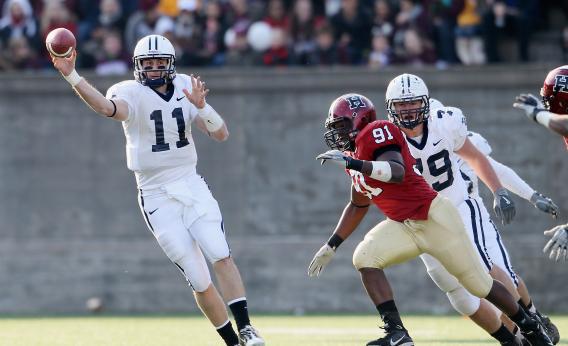As recently as yesterday, Patrick Witt was known as the Yale quarterback who became a media hero after he announced that he would play in the Harvard-Yale football game rather than go to his Rhodes Scholarship interview, which was scheduled for the same day. It turns out that this tidy narrative of athletic fealty was completely false; Witt was no longer eligible for the prestigious award, as the Rhodes Trust had learned of unofficial sexual assault charges against Witt and suspended his application. So the wrenching choice between personal honor and team obligation was actually a convenient cover: Instead of a slap on the wrist for alleged misbehavior, Witt got more laurels.
The New York Times does a pretty thorough job debunking the version of events in which Witt plays a selfless athlete-god. The QB knew when he first applied to the Rhodes about the scheduling conflict and proceeded anyway; he had an off-campus record of two minor arrests, the first for criminal trespass and “creating a public disturbance” outside a New Haven dance club in 2010, and the second, in 2007, for entering a dormitory drunk after hours, lying about his identity, going upstairs without an escort, and then shoving a student guard and running from a police officer. Because they took place off-campus, Yale didn’t know (or didn’t care to know) about these charges when it first endorsed Witt for the scholarship back in October.
As for the alleged sexual assault, the victim lodged charges informally, without filing a police report. So it’s possible that the only university officials who were aware of Witt’s alleged transgressions were members of the new Sexual Assault Harassment and Response and Education Center, the University-Wide Committee on Sexual Misconduct, and eventually the dean of Witt’s residential college. (The dean traditionally writes a glowing report on any Rhodes nominees from his college, although he may not have known about the complaint when he penned Witt’s.)
Still, as one Slate staffer pointed out, it’s odd that the officials involved didn’t see the need to put the assault charges on Witt’s record—and yet when the Rhodes Trust informed the university that they wouldn’t consider Witt unless Yale re-endorsed him, Old Blue declined to stand behind its candidate.
The staffer wrote that if university higher-ups had information suggesting Patrick Witt did not deserve a fellowship, they should have shared it. If they didn’t believe the information was solid because no one had proved anything, then that should have been their reply to the Rhodes Trust.
A certain subgroup of Yale men consistently disrespects women (by the way, Pat Witt was a member of Delta Kappa Epsilon, the fraternity behind 2011’s notorious “No Means Yes” scandal), and the university administration consistently protects them. In 2011, 16 Yale students filed a Title IX complaint against Yale, citing a “hostile sexual environment” – but many think a serious response has yet to materialize. It’s unsettling that, in this case, Yale may have encouraged the press to lionize a student who was dismissed from a competition because of alleged sexual assault. Enough is enough, Old Blue: You’re better than this. Don’t make us all wish we’d gone to Harvard.
